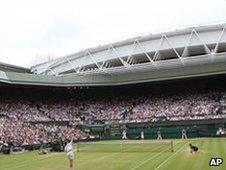MPs want new ban on sport ticket touts
- Published

Wimbledon tickets have been selling for way above face value
A number of MPs are calling for ticket-touting at big sporting events to be made illegal.
The ban would include Wimbledon, where tickets for tomorrow's men's final were being offered on websites for more than £6,000 a pair.
It is only illegal to re-sell tickets for professional football matches.
But now an MP wants touting to be banned at all "crown jewel" sporting events, such as Wimbledon, the Grand National and the Six Nations Rugby.
Sharon Hodgson, Labour MP for Washington and Sunderland North, has the support of a dozen or so colleagues.
"What I want is legislation that makes it a criminal offence to buy up large numbers of tickets, with a view to selling them at a profit," she says.
"If that wasn't allowed, people wouldn't do it."
'People willing'
Legislation already exists to ban the reselling of tickets for the London Olympics, and Ms Hodgson believes that could be extended relatively easily.
She also wants websites that resell tickets to be regulated more tightly, so that they would only be able to charge the face value on a ticket plus a fixed price for re-selling it.
The BBC found one website charging more than £6,000 for a pair of tickets to Sunday's men's singles final at Wimbledon.
But would a ban stop the touts? No, says an organisation which represents companies responsible for reselling tickets.
Jonathan Brown, from the Society of Ticket Agents and Retailers (Star), thinks touting will always continue while there is a demand for it.
"As long as there are people willing to pay those prices, there's somebody there waiting to sell it to you," he says.
Fake sites
In the past the government seems to have taken a similar view.
Andy Burnham, then the culture secretary, ruled out legislation banning touting last year, preferring the idea of a voluntary code of practice.
He was concerned that some fans who had good reason to sell their tickets would not be able to do so.
Sharon Hodgson and her supporters would also like to see touting banned at some cultural events, and even music festivals.
Last year 5,000 music fans trying to buy tickets for festivals like Reading, Leeds and the V Festival were caught out by fake websites.
On average they paid £80 each, but the tickets turned out to be fake, or never arrived.
Make checks
A campaign by the Office of Fair Trading (OFT) is trying to remind festival-goers to examine websites carefully.
It has even produced a fake website of its own.
It appears genuine, until you click through to buy some tickets, whereupon it reveals itself to be fake.
Michele Shambrook, of the OFT, advises fans to stick to official sellers whenever they can.
"Or look to see what other people are saying about the company you're thinking of buying from," she adds.
"Also, check to see if there's a geographical address, and a phone number."
Proper reading
So, what are the chances of a ban becoming law?
MP Sharon Hodgson is in the process of drafting a Private Member's Bill, to try and get a ban enacted.
She has won second place in the ballot, so the bill is at least assured a proper reading in January next year.
But in practice such bills have little chance of success, unless they get government support.
And if the new team at the Department of Culture Media and Support has any such plans, it has not announced them yet.